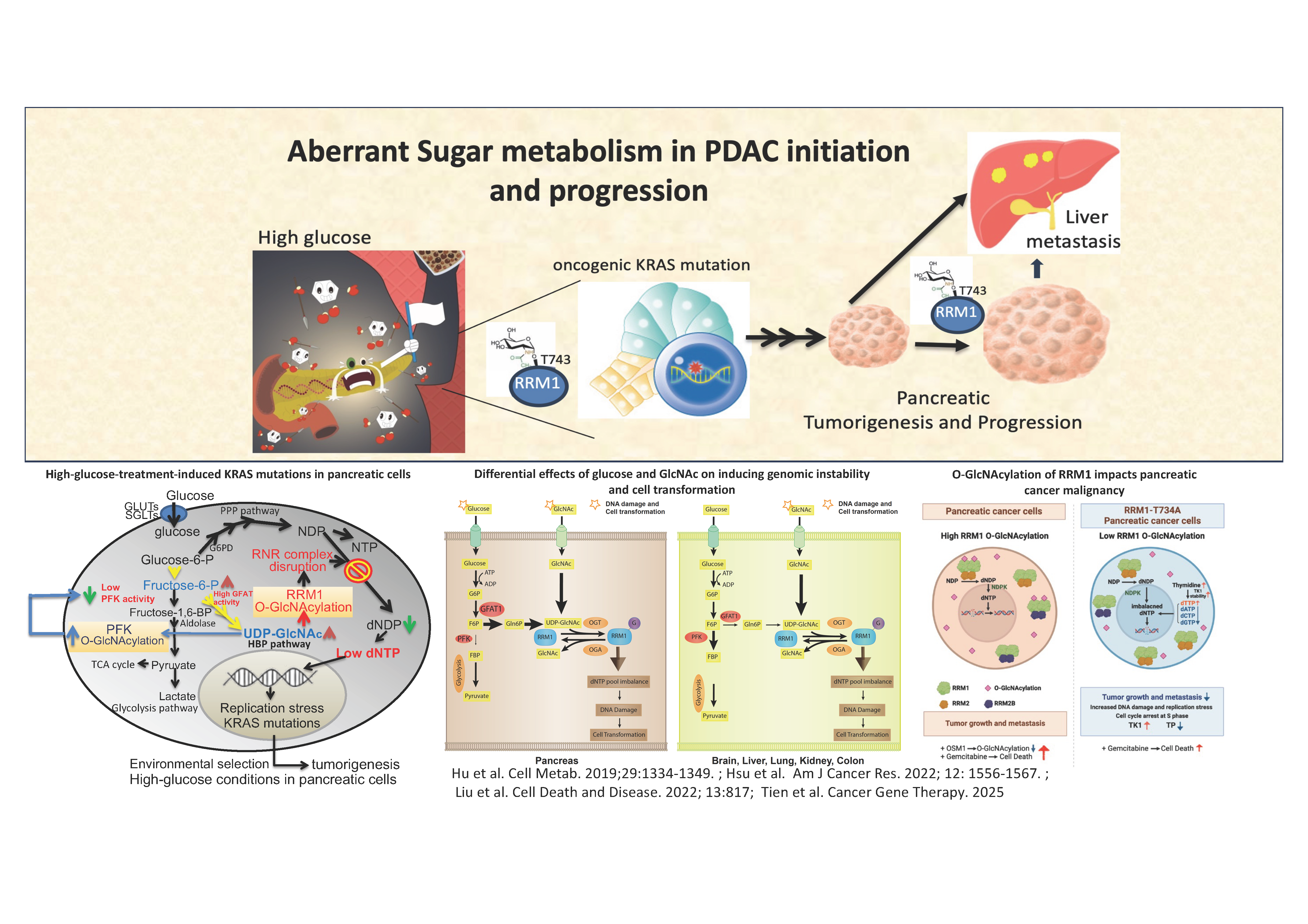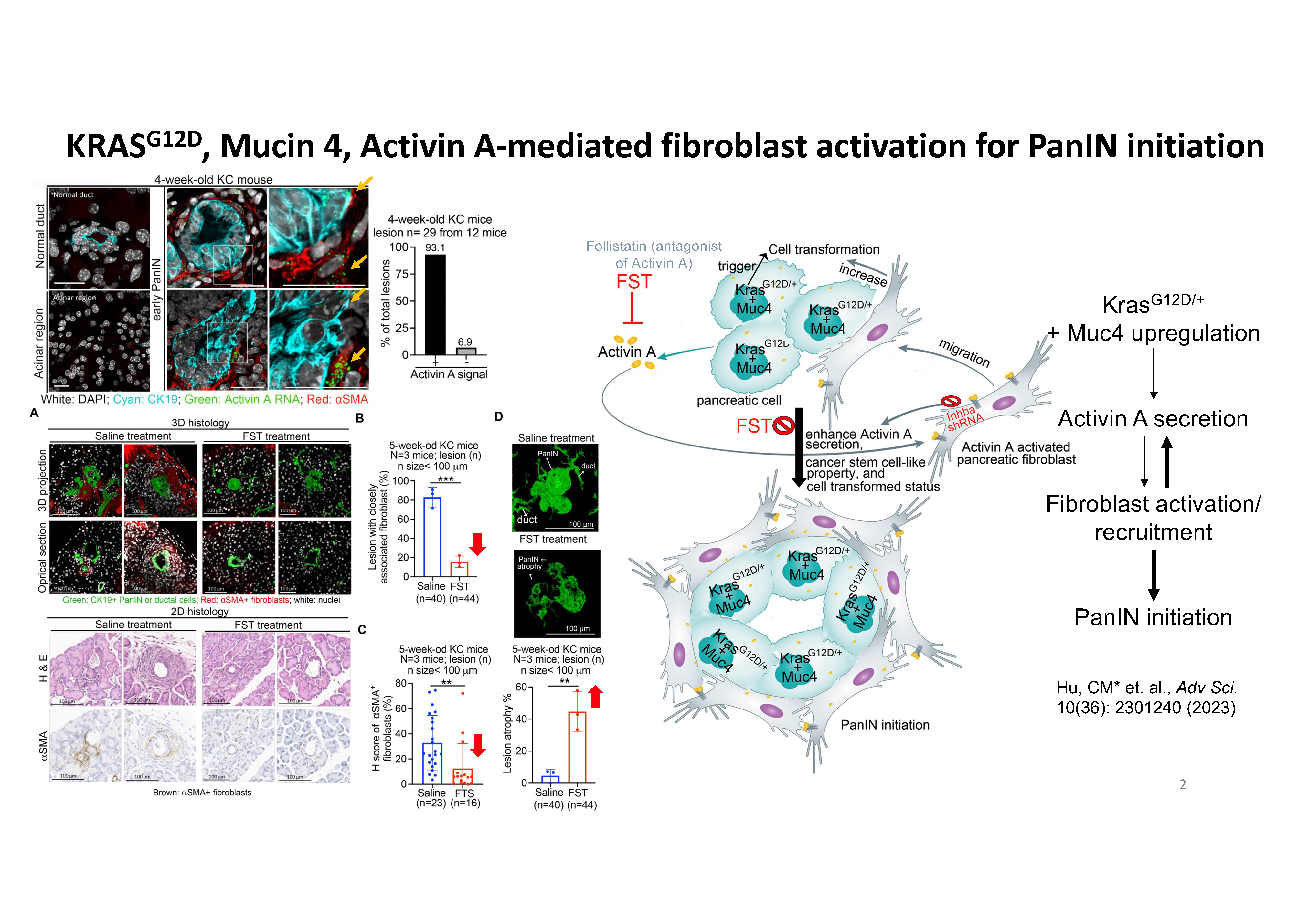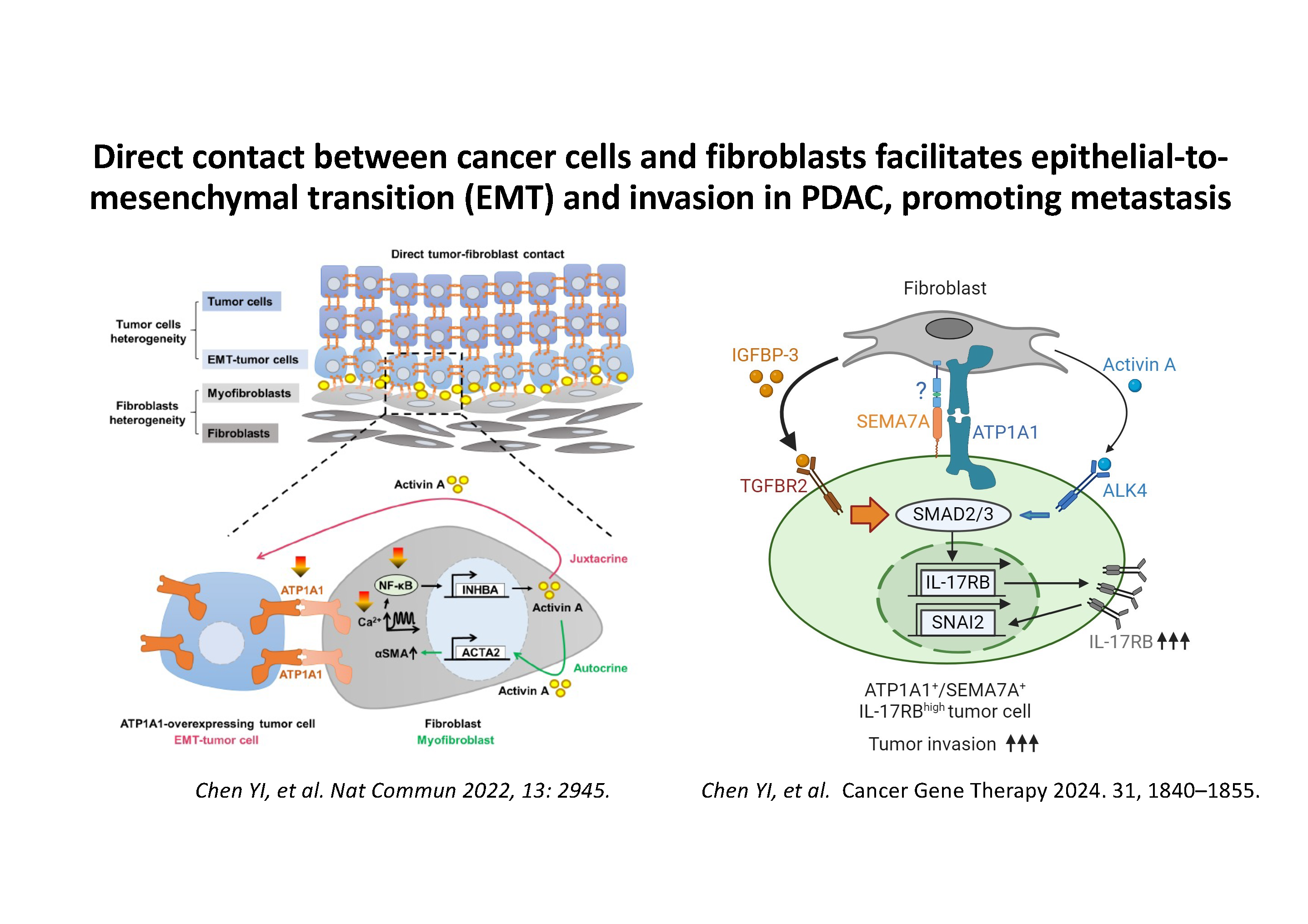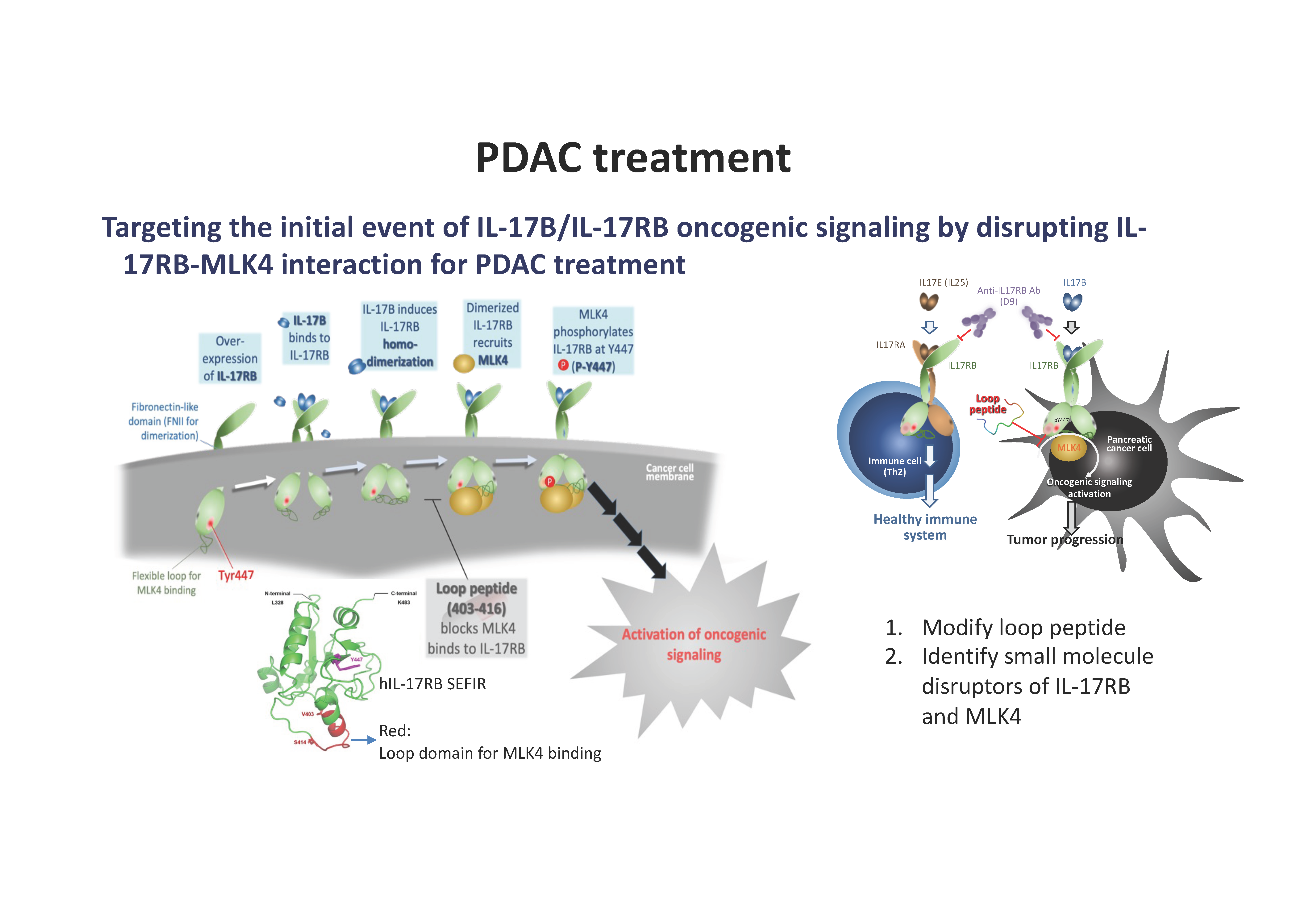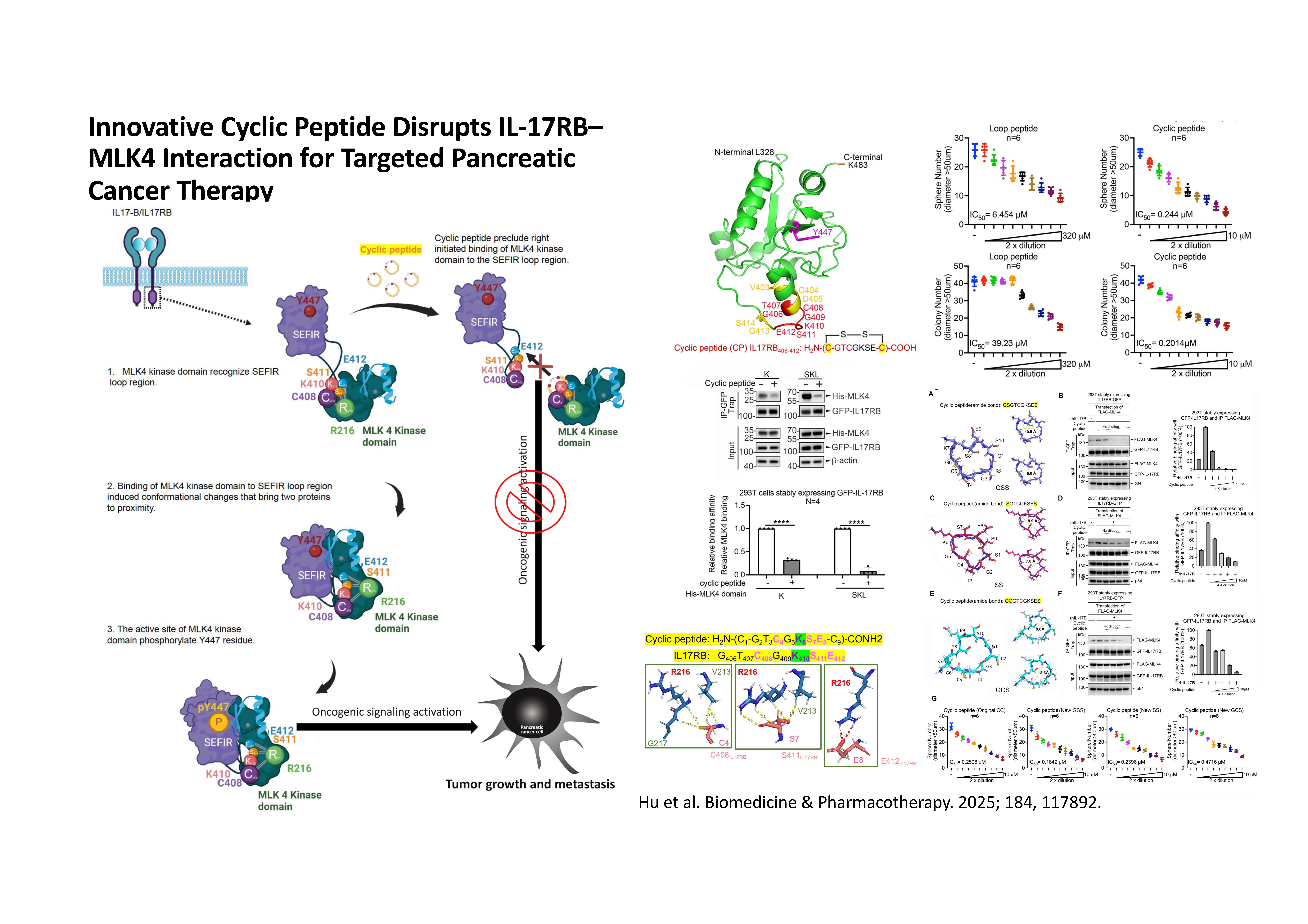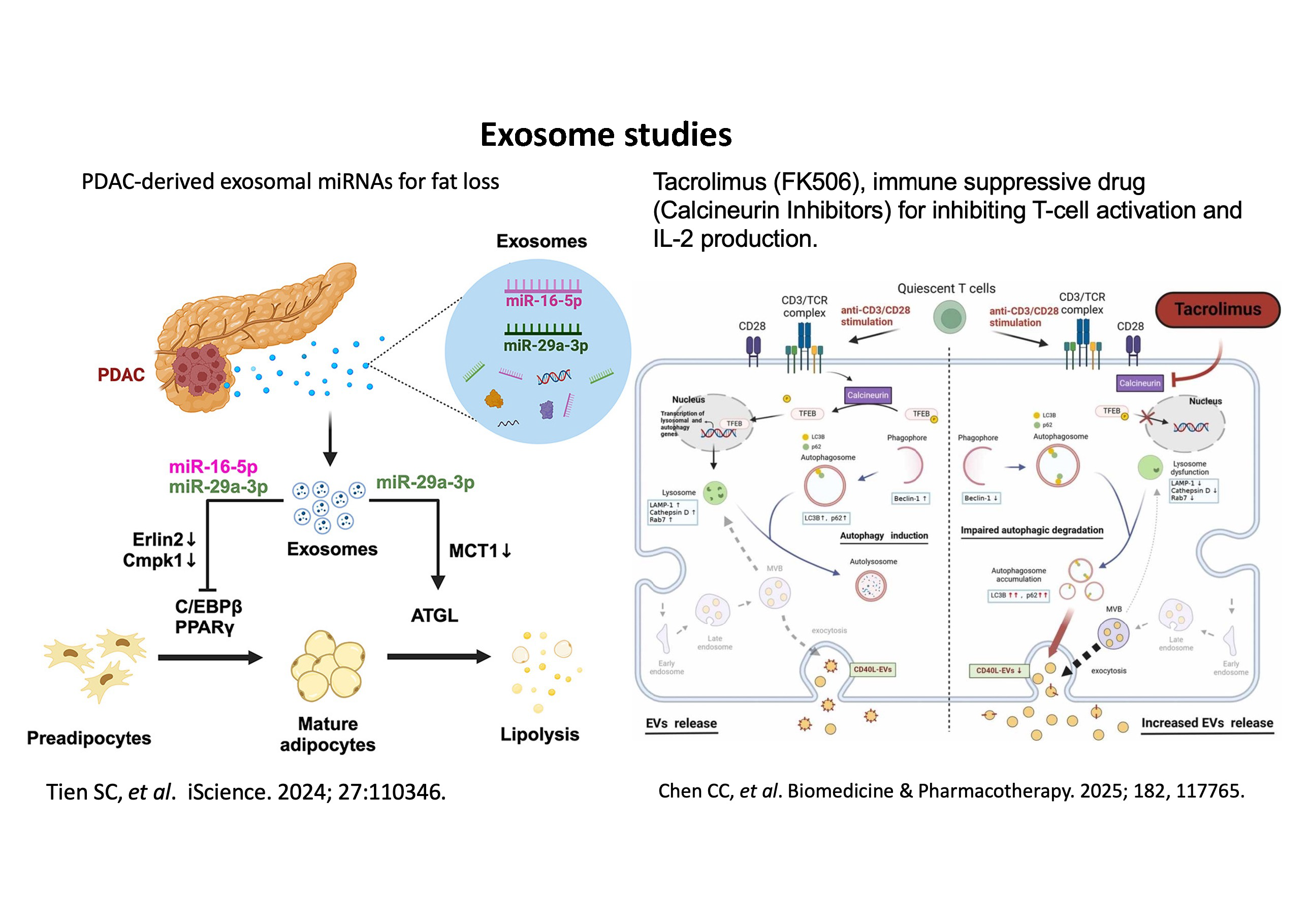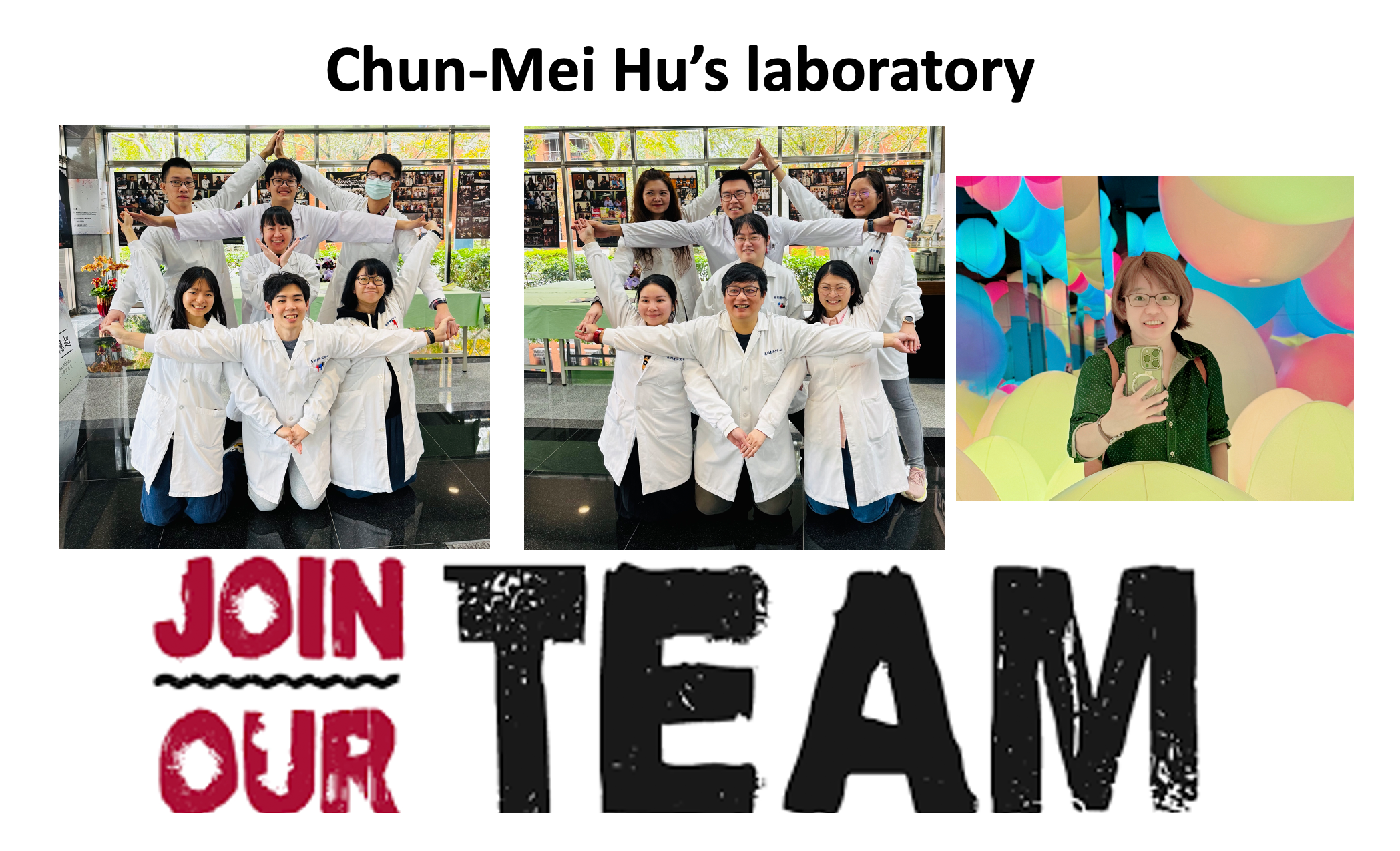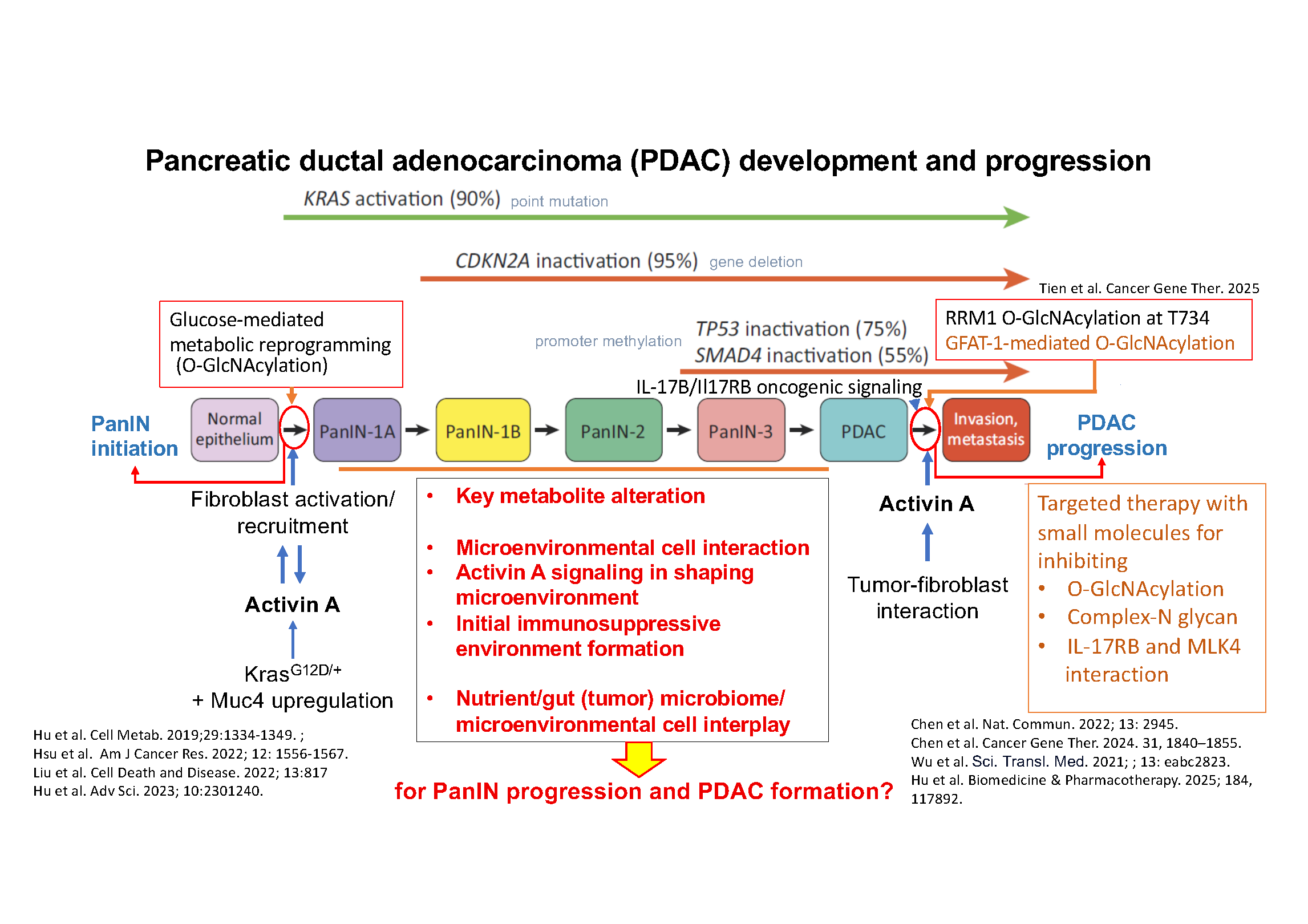| Name | Chun-Mei Hu, Ph.D. |
|---|---|
| Incumbent | Assistant Professor |
| 所屬單位 |
Research topic and interests: Pancreatic ductal adenocarcinoma (PDAC), metabolic disease, glucose/nucleotide metabolism, O-/N-glycosylation, tumor microenvironment, high-throughput drug screening, targeted therapy, metabolite-AI guided diagnosis Ph.D. Graduate Institute of Biochemistry and Molecular Biology, National Taiwan University, College of Medicine, Taiwan, 09/2006-01/2010 |
| NCLscan: |
|
| 研究方向/領域 |
RESEARCH INTERESTSDr. Hu's research focuses on unraveling the complex molecular mechanisms underlying pancreatic cancer initiation and progression, particularly emphasizing the roles of metabolic reprogramming, genetic alterations, and tumor-microenvironment interactions. Her pioneering work has revealed a novel link between excessive sugar intake and pancreatic cancer development via O-GlcNAcylation-induced genomic instability and KRAS mutations. Additionally, her team has pinpointed key genes and signaling pathways, such as RRM1 O-GlcNAcylation, Muc4, ATP1A1, Activin A, IGFBP3, and IL-17RB, as crucial factors in pancreatic cancer initiation and progression. Dr. Hu's research program extends beyond basic science, actively translating these discoveries into innovative diagnostic and therapeutic strategies. Her development of a serum metabolomics-based multimodal machine demonstrates significant promise for early pancreatic cancer detection. Furthermore, she is exploring novel therapeutic avenues, including targeting N-glycan biosynthesis to disrupt cell-cell interactions and inhibiting the IL-17B/IL-17RB oncogenic pathway. Dr. Hu's contributions have significantly deepened our understanding of pancreatic cancer biology, offering hope for improved patient outcomes by developing cutting-edge diagnostic tools and targeted therapies.
|
EDUCATION AND POSITIONS HELD
- 2021-present, Adjunct Assistant Professor, Graduate Institute of Biochemistry and Molecular Biology, National Yang-Ming Chiao Tung University, Taiwan
- 2019-present, Assistant Research Fellow, Genomic Research Center, Academia Sinica, Taiwan
- 2016-present, Adjunct Assistant Professor, Graduate Institute of Biomedical Sciences, China Medical University, Taiwan
- 2014-2019, Assistant Research Specialist, Genomic Research Center, Academia Sinica, Taiwan
- 2013-2014, Postdoctoral Research Fellow, Genomic Research Center, Academia Sinica, Taiwan
- 2012-2013, Postdoctoral Research Fellow, Department of Biological Chemistry, School of Medicine, University of California, Irvine, USA
- 2010-2012, Postdoctoral Research Fellow, Graduate Institute of Biochemistry and Molecular Biology, National Yang-Ming University, Taiwan
HONORS
- 2021 Outstanding Scholar, Department of Biomedical Sciences, Chung Shan Medical University
- 2020 Top Ten Scientific Research Disruptive Innovation Papers Award, Taiwan
- 2019, 2022 One of the Selected Scientific Research papers, Academia Sinica, Taiwan
- 2019 Juei-Low Sung Foundation Distinguished Thesis Award, Taiwan
PATENT
- Chang ZF, Fang JM, Hu CM, Yeh MT.
Targeting Human Thymidylate Kinase Induces DNA Repair Toxicity in Malignant Tumor Cells. US20130252953 A1, CN103476411A, WO2012072019A1. 2013 - Lee WH, Zhu J, Qiu XL, Hu CM.
Small Molecule Modifiers of The Hec1-Nek2 Interaction In G2/M. Pub. No.: U.S.
2015/0105391A1. Pub. Date: April 16, 2015 - Lee WH, Wu HH, Hu CM, Huang CK
ANTAGONIST OF INTERLEUKIN-17B RECEPTOR (IL-17RB) AND USETHEREOF.
(PCT/US2021/063226) - YT Wu, Hu CM. Novel Peptide for the Suppression of Tumor Growth and Metastasis. (28A-1110407)
- Hu CM, YT Wu, Lee WH. Compounds screening method and compounds for inhibiting IL-17RB oncogenic signaling for cancer treatment. (28A-1110406)
- Hu CM, Hsu CP, YT Chang, DN Wu. Utilizing a Full 1H NMR Spectrum-Based Metabolomics-AI Approach for Early Diagnosis of Pancreatic Adenocarcinoma (28A-1130315)
- Tien SC, Shih M and Hu CM*, accepted, “Inhibition of RRM1 O-GlcNAcylation suppresses pancreatic cancer via TK1 stabilization-induced replication stress”, Cancer Gene Therapy. (SCIE)
- Hu CM*, Tien SC, Lo YC, Huang CH, Ko YL, Wu DN, Lee JH, Wu YT, Yu HM, Ling KG, Lee ZY, and Cheng WC, 2025, “Novel cyclic peptide disrupts the IL-17RB/MLK4 interaction for targeted therapy of pancreatic cancer”, Biomedicine & Pharmacotherapy, 184, 117892. (SCIE)
- Tien SC, Chang CC, Huang CH, Peng HY, Chang YT, Chang MC, Lee WH, Hu CM, 2024, “Exosomal miRNA 16-5p/29a-3p from pancreatic cancer induce adipose atrophy by inhibiting adipogenesis and promoting lipolysis.”, iScience, 27, 110346. (SCIE)
- Chen YI, Tien SC, Ko YL, Chang CC, Hsu MF, Chien HJ, Peng HY, Jeng YM, Tien YW, Chang YT, Chang MC, Hu CM*, 2024, “SEMA7A-mediated juxtacrine stimulation of IGFBP-3 upregulates IL-17RB at pancreatic cancer invasive front.”, Cancer gene therapy, 31, 1840-1855. (SCIE)
- Chen Wei‐Ju, Huang Wei‐Kai, Pather Sarshan R., Chang Wei‐Fang, Sung Li‐Ying, Wu Han‐Chung, Liao Mei‐Ying, Lee Chi‐Chiu, Wu Hsuan‐Hui, Wu Chung‐Yi, Liao Kuo‐Shiang, Lin Chun‐Yu, Yang Shang‐Chih, Lin Hsuan, Lai Pei‐Lun, Ng Chi‐Hou, Hu Chun‐Mei, Chen I‐Chih, Chuang Chi‐Hsuan, Lai Chien‐Ying, Lin Po‐Yu, Lee Yueh‐Chang, Schuyler Scott C., Schambach Axel, Lu Frank Leigh, Lu Jean, 2023, “Podocalyxin‐Like Protein 1 Regulates Pluripotency through the Cholesterol Biosynthesis Pathway”, Advanced Science, 10(1), 2205451. (SCIE)
- Hu CM, Huang CC, Hsu MF, Chien HJ, Wu PJ, Chen YI, Jeng YM, Tang SC, Chung MH, Shen CN, Chang MC, Chang YT, Tien YW, Lee WH, 2023, “Oncogenic KRAS, Mucin 4, and Activin A-Mediated Fibroblast Activation Cooperate for PanIN Initiation.”, Advanced Science (Weinheim, Baden-Wurttemberg, Germany), 2301240, 1-20. (SCIE)
- Chang YT, Peng HY, Hu CM, Tien SC, Chen YI, Jeng YM, Chang MC, 2023, “Pancreatic cancer-derived small extracellular vesical ezrin activates fibroblasts to exacerbate cancer metastasis through STAT3 and YAP-1 signaling pathways.”, Molecular Oncology, 17, 1628-1647. (SCIE)
- Chen Jia-Yang, Chou Hsu-Huan, Lim Syer Choon, Huang Yen-Jang, Lai Kuan-Chen, Guo Chin-Lin, Tung Chien-Yi, Su Chung-Tsai, Wang Jocelyn, Liu Edward, Han Hsiao-Fen, Yeh Po-Ying, Hu Chun-Mei, Dunn Alexander R., Frank Curtis W., Wu Yi-Chun, Yang Muh-Hwa, Chang Ying-Chih, 2022, “Multiomic characterization and drug testing establish circulating tumor cells as an ex vivo tool for personalized medicine”, iScience, 25(10), 105081. (SCIE)
- Lee Wen-Hsin, Chen Xiaorui, Liu I-Ju, Lee Jiin-Horng, Hu Chun-Mei, Wu Han-Chung, Wang Sheng-Kai, Lee Wen-Hwa, Ma Che, 2022, “Structural basis of interleukin-17B receptor in complex with a neutralizing antibody for guiding humanization and affinity maturation”, Cell Reports, 41(4), 111555. (SCIE)
- Hsu YS, Wu PJ, Jeng YM, Hu CM*, Lee WH*., 2022, “Differential Effects of Glucose and N-acetylglucosamine on Genome instability.”, Am J Cancer Res, 12(4), 1556-1567. (SCIE)
- Chen YI, Chang CC, Hsu MF, Jeng YM, Tien YW, Chang MC, Chang YT, Hu CM, Lee WH, 2022, “Homophilic ATP1A1 binding induces activin A secretion to promote EMT of tumor cells and myofibroblast activation.”, Nature communications, 13, 2945. (SCIE)
- Liu Yu-Huei, Hu Chun-Mei, Hsu Yuan-Sheng, Lee Wen-Hwa, 2022, “Interplays of glucose metabolism and KRAS mutation in pancreatic ductal adenocarcinoma”, Cell Death & Disease, 13(9), 817-826. (SCIE)
- Wu HH, Tsai LH, Huang CK, Hsu PH, Chen MY, Chen YI, Hu CM, Shen CN, Lee CC, Chang MC, Chang YT, Tien YW, Jeng YM, Lee EYP, Lee WH, 2021, “Characterization of Initial Key Steps of IL-17 Receptor B Oncogenic Signaling for Targeted Therapy of Pancreatic Cancer”, Science Translational Medicine, 13(583), eabc2823. (SCIE)
- Su FY, Hung SC, Wei PC, Su LW, Hsu PH, Li JP, Lan JL, Hsieh YL, Hu CM, Chun CY, Sytwu HK, Lee EY and Lee WH., 2021, “Redox sensor NPGPx restrains ZAP70 activity and modulates T cell homeostasis”, Free Radical Biology and Medicine, 165, 368-384. (SCIE)
- Hsu JL, Chou JW, Su FY, Lan JL, Wu PC, Hu CM, Lee EY and Lee WH*, 2020, “Glutathione peroxidase 8 negatively regulates caspase-4/11 to protect against colitis.”, EMBO MOLECULAR MEDICINE, 12, e9386. (SCIE)
- Hsieh YL, Tsai LK, Su FY, Tsai YC, Ko YL, Hu CM, Hsiu-Ming Shih and Lee WH*., 2019, “NPGPx-Mediated Adaptation to Oxidative Stress Protects Motor Neurons from Degeneration in Aging by Directly Modulating O-GlcNAcase”, CELL REPORTS, 29, 2134-2143. (SCIE)
- Hu CM*, Tien SC, Hsieh PK, Jeng YM, Chang MC, Chang YT, Chen YJ, Chen YJ, Lee EY and Lee WH, 2019, “High glucose triggers nucleotide imbalance through O-GlcNAcylation of key enzymes and induces KRAS mutation in pancreatic cells”, CELL METABOLISM, 29, 1334-1349. (SCIE)
- Chen YL, Hu CM, Hsu JT, Chang CC, Huang TY, Chiang PH, Chen WY, Chang YT, Chang MC, Tien YW, Lee EY, Jeng YM and Lee WH, 2018, “Cellular 5-hydroxylmethylcytosine content determines tumorigenic potential and prognosis of pancreatic ductal adenocarcinoma”, American journal of cancer research., 8, 2548-2563. (SCIE)
- Huang SC, Wei PC, Hwang-Verslues WW, Kuo WH, Jeng YM, Hu CM, Shew JY, Huang CS, Chang KJ, Lee EY and Lee WH, 2017, “TGF-β1 secreted by Tregs in lymph nodes promotes breast cancer malignancy via up-regulation of IL-17RB.”, EMBO molecular medicine, 9, 1660-1680. (SCIE)
- Huang CK, Chang PH, Kuo WH, Chen CL, Jeng YM, Chang KJ, Shew JY, Hu CM and Lee WH., 2017, “Adipocytes promote malignant growth of breast tumours with monocarboxylate transporter 2 expression via β-hydroxybutyrate.”, nature communications, 8, 14706. (SCIE)
- Hu CM, Zhu J, Guo XE, Chen W, Qiu XL, Ngo B, Chien R, Wang YV, Tsai CY, Wu G, Kim Y, Lopez R, Chamberlin AR, Lee EH, Lee WH., 2015, “Novel small molecules disrupting Hec1/Nek2 interaction ablates tumor progression by triggering Nek2 degradation through a death-trap mechanism.”, ONCOGENE, 34(10), 1220-1230. (SCIE)
- Ngo B, Hu CM, Guo XE, Ngo B, Wei R, Zhu J and Lee WH., 2013, “Complementary interhelical interactions between three buried Glu-Lys pairs within three heptad repeats are essential for Hec1-Nuf2 heterodimerization and mitotic progression.”, JOURNAL OF BIOLOGICAL CHEMISTRY, 288, 34403-34413. (SCIE)
- Zhu J, Zhou L, Wu G, Konig H, Lin X, Li G, Qiu XL, Chen CF, Hu CM, Goldblatt E, Bhatia R, Chamberlin AR, Chen PL, Lee WH. , 2013, “A novel small molecule RAD51 inactivator overcomes imatinib-resistance in chronic myeloid leukaemia.”, EMBO Molecular Medicine, 5, 353-365. (SCIE)
- Hu CM, Yeh MT, Tsao N, Chen CW, Gao QZ, Chang CY, Lee MH, Fang JM, Sheu SY, Lin CJ, Tseng MC, Chen YJ, Chang ZF, 2012, “Tumor cells require thymidylate kinase to prevent dUTP incorporation during DNA repair.”, CANCER CELL, 22, 36-50. (SCIE)
- Hu CM, Chang ZF , 2010, “A bioluminescent method for measuring thymidylate kinase activity suitable for high-throughput screening of inhibitor.”, ANALYTICAL CHEMISTRY, 398(2), 269-271. (SCIE)
- Hu CM, Chang ZF., 2008, “Synthetic lethality by lentiviral short hairpin RNA silencing of thymidylate kinase and doxorubicin in colon cancer cells regardless of the p53 status.”, CANCER RESEARCH, 68(8), 2831-2840. (SCIE)
- Hu CM, Chang ZF, 2007, “Mitotic control of dTTP pool: a necessity or coincidence? ”, JOURNAL OF BIOMEDICAL SCIENCE, 14(4), 491-497. (SCIE)
- Ke PY, Hu CM, Chang YC, Chang ZF. , 2007, “Hiding human thymidine kinase 1 from APC/C- mediated destruction by thymidine binding.”, FASEB JOURNAL, 21, 1276-1284. (SCIE)
- Ke PY, Kuo YY, Hu CM, Chang ZF., 2005, “Control of dTTP pool size by anaphase promoting complex/cyclosome is essential for the maintenance of genetic stability. ”, GENES & DEVELOPMENT, 19, 1920-1933. (SCIE)
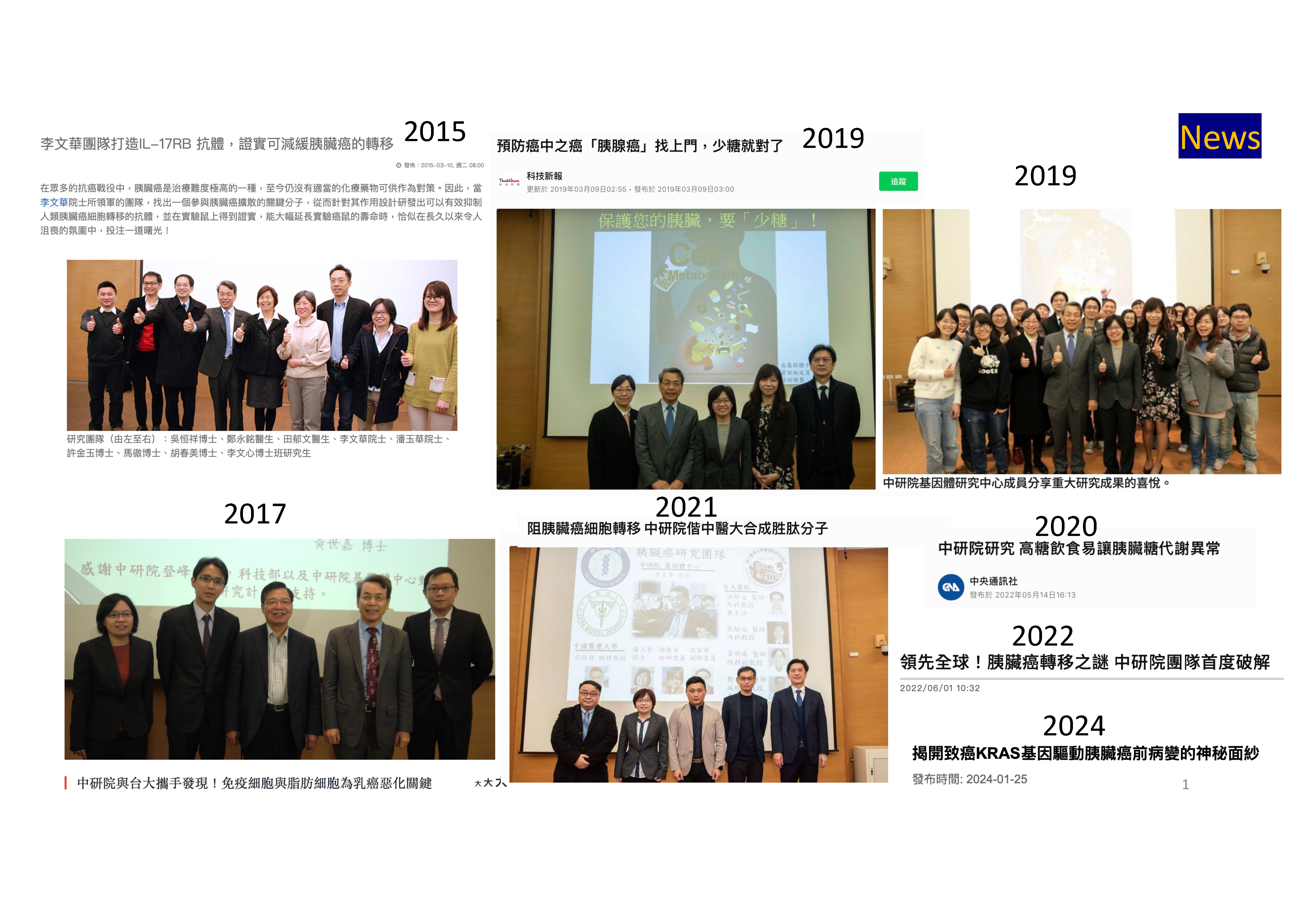
YouTube:
- Pancreatic cancer culprit! Academia Sinica confirmed for the first time that it was caused by "sugar"https://www.youtube.com/watch?v=E3fgAODgY-4 Views: 732,772 times 2019/03/17
- "King of Cancer" Pancreatic cancer, fatty liver, and other diseases are related to "it." Cancer risk factors https://www.youtube.com/watch?v=ang7FrA8vXA Views: 1,478,383 times 2022/01/16
- Thirteen types of cancer are related to "it." Breast cancer tumor grows Academia Sinica reveals the key reason│Women's cancer health revealed. Views: 7894 times 2022/04/30
https://www.youtube.com/watch?v=xugDtXmu5xY
